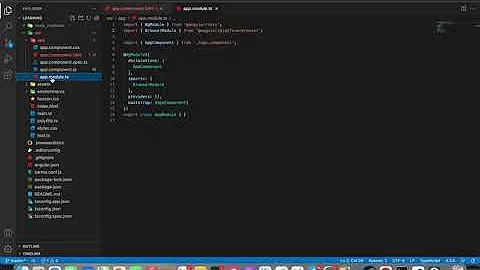Angular2 Can't bind to DIRECTIVE since it isn't a known property of element
Solution 1
When wrapping a property in brackets [] you're trying to bind to it. So you have to declare it as an @Input.
import { Directive, Input } from '@angular/core';
@Directive({
selector: '[appContenteditableModel]'
})
export class ContenteditableModelDirective {
@Input()
appContenteditableModel: string;
constructor() { }
}
The important part is, that the member (appContenteditableModel) needs to be named as the property on the DOM node (and, in this case, the directive selector).
Solution 2
If you're using a shared module to define the directive make sure it is both declared and exported by the module it's defined in.
// this is the SHARED module, where you're defining directives to use elsewhere
@NgModule({
imports: [
CommonModule
],
declarations: [NgIfEmptyDirective, SmartImageDirective],
exports: [NgIfEmptyDirective, SmartImageDirective]
})
Solution 3
I was facing the same issue with a directive declared in a shared module. I'm using this directive to disable a form control.
import { Directive, Input } from '@angular/core';
import { NgControl } from '@angular/forms';
@Directive({
selector: '[appDisableControl]'
})
export class DisableControlDirective {
constructor(private ngControl: NgControl) { }
@Input('disableControl') set disableControl( condition: boolean) {
const action = condition ? 'disable' : 'enable';
this.ngControl.control[action]();
}
}
To work it properly, declare and export the directive in shared module (or any module you are using).
import { NgModule } from '@angular/core';
import { CommonModule } from '@angular/common';
import { DisableControlDirective } from './directives/disable-control/disable-control.directive';
@NgModule({
declarations: [
DisableControlDirective
],
imports: [
CommonModule
],
exports: [DisableControlDirective],
providers: [],
bootstrap: []
})
export class SharedModule { }
Now we can use this directive in any module where we are importing SharedModule.
Now to disable a reactive form's control, we can use it like this:
<input type="text" class="form-control" name="userName" formControlName="userName" appDisableControl [disableControl]="disable" />
Mistake I was doing it, I was using only selector (appDisableControl) and passing the disable param to this. but to pass an input param, we have to use it like above.
Solution 4
For me the fix was moving the directive references from root app.module.ts (the lines for import, declarations, and/or exports) to the more specific module src/subapp/subapp.module.ts my component belonged to.
Solution 5
In sum, because your directive looks like an anchor directive, remove the brackets and it would work.
Actually, I have not found the corresponding sections related to when the brackets should be removed or not, where only one mention I've found is located at the section on dynamic components:
Apply that to
<ng-template>without the square brackets
, which is however not perfectly covered in the Attribute Directives document.
Individually, I agree with you and was thinking that [appContenteditableModel] should be equal to appContenteditableModel and angular template parser might work around whether there is @input() data binding or not automatically, as well. But they seem exactly not processed equally under the hood, even in current Angular Version of 7.
Related videos on Youtube
Tomas Javurek
Updated on July 08, 2022Comments
-
 Tomas Javurek almost 2 years
Tomas Javurek almost 2 yearsI generated new @Directive by Angular CLI, it was imported it to my app.module.ts
import { ContenteditableModelDirective } from './directives/contenteditable-model.directive'; import { ChatWindowComponent } from './chat-window/chat-window.component'; @NgModule({ declarations: [ AppComponent, ContenteditableModelDirective, ChatWindowComponent, ... ], imports: [ ... ], ... })and I try to use in my component (ChatWindowComponent)
<p [appContenteditableModel] > Write message </p>even if within directive is only Angular CLI generated code:
import { Directive } from '@angular/core'; @Directive({ selector: '[appContenteditableModel]' }) export class ContenteditableModelDirective { constructor() { } }I got the error:
zone.js:388 Unhandled Promise rejection: Template parse errors: Can't bind to 'appContenteditableModel' since it isn't a known property of 'p'.
I tried almost every possible changes, following this angular docs everything should work but it does not.
Any help?
-
 Tomas Javurek over 7 yearsThe result I need is
Tomas Javurek over 7 yearsThe result I need is[(appContenteditableModel)]="draftMessage.text"at the end... -
 Sanket over 7 yearsThen try like this
Sanket over 7 yearsThen try like this<p [appContenteditableModel]="draftMessage.text"></p> -
 Tomas Javurek over 7 yearsIt works without brackets
Tomas Javurek over 7 yearsIt works without bracketsappContenteditableModel="draftMessage.text"and also(appContenteditableMode)l="draftMessage.text"resolve the promise rejection but it also seems to do not pass the variable
-
-
 Tomas Javurek over 7 yearsI have input
Tomas Javurek over 7 yearsI have input@Input ('appContenteditableModel') model : any;and also output@Output ('appContenteditableModel') update : EventEmitter<any> = new EventEmitter();in my directive. It seems that the model works well but the emitter called bythis.update.emit(value)does not change the value in parent component. What I do wrong?[(appContenteditableModel)]="draftMessage.text" -
 Tomas Javurek over 7 yearsActually I try to "simulate" [(ngModel)] outside of <input> element
Tomas Javurek over 7 yearsActually I try to "simulate" [(ngModel)] outside of <input> element -
naeramarth7 over 7 years
@Outputis for emitting events only. If you want to keep the value in sync with the parent's, you may consider adding the@HostBindingannotation. -
 Tomas Javurek over 7 yearsIf I undersand well
Tomas Javurek over 7 yearsIf I undersand well@HostBindingwill help to keep the value in sync within the html element, am I right? This element I need to be edited by usercontenteditable="true"so that input I need to keep in sync with the variable in the same component. -
Ohad Sadan over 5 yearsand what if they are not in the same module?
-
aruno over 5 years@OhadSadan I'm not sure exactly what you mean. This is an example of when you don't have them in the same module, and I'm just saying make sure to declare AND export directives if you're creating them in a shared module (which you must then then import them into a different module).
-
aruno over 5 yearsIn your 'main' module you only need to import the 'directives module' and then all your components can see them.
-
Sami almost 4 yearsThis is a minute detail but often missed. Thank you !
-
Luizgrs about 3 yearsif using strict mode and your directive requires no value, you need to do
appContenteditableModel = undefined; -
 Kurtis Jungersen about 3 yearsAh thank you. In case someone else runs into it, my specific issue was that the directive selector (e.g.
Kurtis Jungersen about 3 yearsAh thank you. In case someone else runs into it, my specific issue was that the directive selector (e.g.selector: 'fooDirective') didn't match the@Input()property name (e.g.@Input() barDirective). I renamed the selector, but didn't think about the property too. -
noririco almost 3 yearsWTF ??????? any explanation for that ?? and it worked after 2 hours !
-
27px over 2 yearsString did not work for me as I was using no value for the attribute, used any and it worked, I know i have to give a value for attribute but, that was my case.
-
Experimenter over 2 years"The important part is, that the member (appContenteditableModel) needs to be named as the property on the DOM node (and, in this case, the directive selector)" - holy cow, didn't find it in the docs. Thanks!



![[Debugging] Can't bind to {prop} since it isn't a know property of {node}](https://i.ytimg.com/vi/wfLkB3RsSJM/hq720.jpg?sqp=-oaymwEcCNAFEJQDSFXyq4qpAw4IARUAAIhCGAFwAcABBg==&rs=AOn4CLA5gWt9SPo0ZcMmoozSI2icFpClCw)


